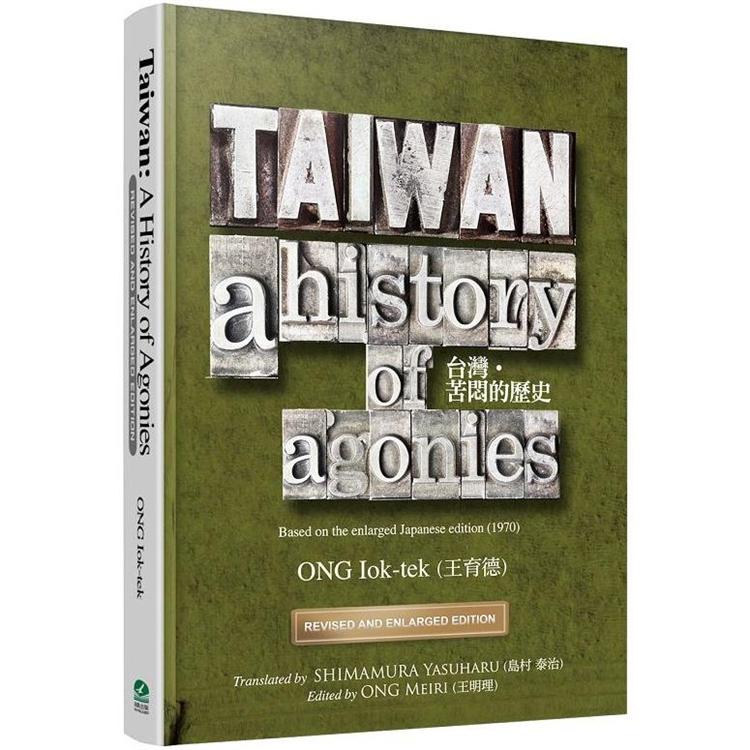TAIWAN:A History of Agonies(Revised and Enlarged Edition)
活動訊息
內容簡介
“Taiwan is not China.
The Taiwanese are not the Chinese.
Taiwan should be ruled by Taiwanese themselves.”
This long-awaited English version will be the foundation stone on which for the peoples of the world will deepen their understanding of the Taiwan affairs and the Taiwan-China relations.
The US Presidential election having turned out as it did, the world is watching Taiwan closer and harder than ever before - now what happens to Taiwan?
Taiwan is no part of China. Taiwanese are not Chinese. This book tells just that.
The author, Ong Iok-tek, also a linguist, wrote this book while in exile in Japan to let the world know the truth of the history of Taiwan. Ardently read and reread over half a century since its publication, this book has come to claim its due status as the most authentic historical account of Taiwan that has affected many a Taiwanese. It goes and proves then that this book so vividly portrays the realty of Taiwan based strictly on nothing but scientific, objective truths.
China’s claim over Taiwan as its “territory” is totally groundless; nor has China any legitimate ground on which to annex Taiwan. That this book so eloquently appeals you as you turn the pages.
Since the dawn of its history, the island of Taiwan has paved its own way apart from China. It did come under the severest illegal rule by the Chinese Kuomintang after the World War II, but the Taiwanese have proudly demonstrated their high level of national traits to singlehandedly recover a genuine democratic state of their own.
Fully aware of Taiwan’s geo-political importance, China has incessantly exerted every illicit means in an attempt to drag Taiwan into their sphere of power. Now is the time, more so than ever before, Taiwan stands as a fortress that all nations of the world must join together in its defense in the name of freedoms and democracy. Should Taiwan be once gulped into the dictatorial China, freedoms, human rights, and democracy we mankind have passed centuries to defend would be treaded upon overnight.
To block China’s illicit designs, the problems surrounding Taiwan ought to be better and closer appreciated. That is the very reason why this book, now crisply translated into English, now at a most opportune moment when the world intently looks upon the destiny of Taiwan.
目錄
Preface / Ng Chiau-tong (黃昭堂)
Preface / Ong Meiri (王明理)
Some Remarks on Changes in Ong Iok-tek’s Recognition of Indigenous People of Taiwan / Kondo Aya (近藤綾)
Explanatory Note
Preliminary Remarks
Introduction A Stormy Situation Facing Taiwan
Chapter 1 A LAND OF FATEFUL PAST—In search of a new world
1. Taiwan: How it was so named
2. Of Pirate Families
3. Hardships: It all began in the Penghu Islands
4. Japan’s Ambition
5. The Tragedy of Indigenes
Chapter 2 A NEW WORLD YET INCOMPLETE—Dutch period (1624-1661)
1. Dutch Rule
2. Footsteps of the Spaniards up North
3. Transit Trade Boomed
4. The Indigenes under Control
5. The Early Honeymoon Period
6. Taiwanese Society under Dutch Rule
7. Kuo Huai-i’s Rebellion
Chapter 3 KOXINGA: HIS BRIGHT AND DARK SIDES—Cheng period (1661-1683)
1. The Cheng: A prototype of the Kuomintang regime
2. Flight to Taiwan
3. The Cheng: Its nature
4. The Cheng: Its inner conflict
5. Resistance or Truce?
6. The Harshest Demand Ever
Chapter 4 A PILE OF BLOOD AND SWEAT—Qing period (1683-1895)
1. “Isolate Dangerous Elements”
2. Heading for Taiwan in Droves
3. The Life of the Pioneers
4. Corrupt and Incompetent Officials of the Qing Court
5. “Minor Rebellion Every Three Years,Major Rebellion Every 5 Years”
6. “Factionalism and Feuding”
7. Fu-chien’s Colony
8. Land and People beyond Qing’s Rule
9. The Taiwan Strait—History’s Watershed
Chapter 5 NO ONE BUT TAIWANESE—Republic of Formosa (1895)
1. Forsaken Before You Knew
2. The Nature of the Republic of Formosa
3. Qing’s Soldiers and Taiwanese
Chapter 6 IN THE VORTEX OF MODERNIZATION—The Japan colonial period (1895-1945)
1. What Did the Japanese Inherit
2. Successful Colonial Rule
3. Some Comparisons: Vertical and horizontal
4. Hopeless Armed Resistance
5. A Thorough Carrot-and-Stick Policy
6. Chien Ta-shih and Ch’en Ch’iu-chu
7. A Superstitious “Conspiracy”
8. Lin Hsien-t’ang and Overseas Students
9. Ideals and Realities of the Culture Society
10. “What’s Wrong about Becoming a Japanese?”
11. Division in Prosperity
12. Taiwan Communist Party and its Counterparts in Japan and China
13. Criticisms and Evaluations of the Two Japanese Scholars
14. Agonizing while Transfiguring
Chapter 7 ALL-OUT CONFRONTATION WITH THE CHINESE—Kuomintang period (1945-1963)
1. Dogs Gone; Pigs Come
2. The Great 2.28 Rebellion
3. The League for Re-liberation of Taiwan in Hong Kong
4. Fleeing to Taiwan
5. Great Oppression and Wu Kuo-chen’s Downfall
6. A Refugee Regime; A House of Contradictions
7. Land Reform in Disguise
8. The Trick of “Counterattack”
9. An Ugly Face behind the Mask
10. Ultimate Struggle
11. Lei Chen and Opposition Party Movement
12. Overseas Independence Movements
13. Between the United States and the Kuomintang Regime
14. Between Chinese Communists and the Kuomintang
Chapter 8 FROM 1960’s to 1970’s—1964~
1. Harassed from Within and Without
2. The Vietnam War and the Cultural Revolution
3. The Advance of Japanese Capital in Taiwan
4. Chiang Ching-kuo and the P’eng Ming-min Incident
Concluding Chapter Taiwan’s Independence
序/導讀
序
Taiwan, O My Homeland
Taiwan, O my Homeland,
The soil I live and die on,
Where ten million of my fellow countrymen
With me forever share every joy and grief.
Every drop of blood, sweat and tears
Shed over the soil had my ancestors,
Solely in search of good fortune.
Let be past our humiliation-stained past
Let us pry open afresh today
A wholly new history of our own
—Ong Iok-tek
Preface One
The editor takes the liberty of transcribing in its entirety the preface by Ng Chiau-tong originally written for the Collection of Works of Dr. Ong, including the closing paragraph in which the author expresses his words of gratitude to those who had contributed to have the collection published.
Ng Chiau-tong (黄昭堂)
Professor Emeritus, Showa University, Japan (1932-2011)
Seventeen years having elapsed since the passing of Dr. Ong Iok-tek, I feel very much elated to see one of his major works thus published.
Hailed in Tainan, Dr. Ong devoted his entire life to the cause of Taiwan independence movement. He was a spiritual leader and the key man of the movement; it was under his auspices that “The Taiwan Youth”, the predecessor of the World United Formosans for Independence, was inaugurated in 1960. At the height of the Chiang Kai-shek regime’s white terror, Taiwan society was under the grossest of threats, academics being silenced and the Taiwanese populace disrespected and looked down upon as second-class citizens. Dr. Ong was convinced that only upon the establishment of their own nation could the Taiwanese ever free themselves of the misery. That conviction drove him to setting on the arduous road of advocating Taiwan independence.
The magazine “Taiwan Youth “ was a ray of hope for the Taiwanese at that moment of time. A regularly published magazine of a rich variety of theses and contributions on political and cultural issues confronting Taiwan at that time, the “Taiwan Youth “ targeted inspiring spiritual awareness of the Taiwanese. However, the task of promoting such political awareness was for him easier said than done.
Dr. Ong was still then a doctoral student at Tokyo University and concurrently a part-time adjunct instructor at the College of Commerce, Meiji University. Out of his meager income he covered the costs of several Taiwanese students helping him running the magazine. He had quite a heavy load of burdens to bear; while writing essays for the magazine and elsewhere, correcting manuscripts in Japanese, proofreading, printing, mailing, and all the other chores, he personally took part in raising money to keep the magazine going.
The Taiwan Youth was started in Tokyo, the capital of Japan, initially with Taiwanese supporters living in and around Tokyo. Gradually support started coming from Kobe, Osaka and other areas, and soon from the United States in increasing numbers from among the Taiwanese studying there. Later, the Taiwan Youth” changed its name first to the “Society of Taiwan Youth”, then to the “Taiwan Youth Independence Alliance” and, in 1970, as groups of movement for Taiwan independence mushrooming all over the world, it renamed itself again to the “Taiwan Independence Alliance”, and eventually to the World United Formosans for Independence (WUFI). Dr. Ong was a man of foresight and inspiration. He held and will hold an immortal position in the history of Taiwan independence movement.
At Meiji University he became a full-time instructor and latter excelled himself to the posts of associate professor and finally full professor. He was in fact one of the first foreign professors at a time when Japanese universities were still reluctant to employ foreign professors. He taught Chinese Language and Chinese Studies successively at Tokyo University, Saitama University, Tokyo University of Foreign Studies, Tokyo University of Education, and Tokyo Metropolitan University. He was especially excited when invited to teach Taiwanese Language courses at Tokyo University of Foreign Studies and Tokyo Metropolitan University. He taught many students over altogether 27 years of his teaching career. As he aged he developed a heart complication but kept on working strenuously.
His love for his compatriots revealed itself in the issue of compensations for Japanese servicemen of Taiwanese ancestry and their dependents. Those people who had served, voluntarily or involuntarily, in the Japanese armed forces during World War II were living under the rule of the Chiang Kai-shek regime after the war. They were living in utter poverty and hardship in Taiwan, with no compensation whatsoever by the Japanese government. In 1975, Dr. Ong organized the “Association for Compensation of Japanese Servicemen of Taiwanese Ancestry” and directed activities for holding indoor meetings, street rallies etc., and filed law suits against the Japanese government at the Tokyo District Court and subsequently the High Court, and eventually the Supreme Court. That legal process took a decade, during which he fell ill. His selfless and tireless efforts rang the bell in the hearts of Japanese politicians and, in 1986, the Japanese Diet passed a resolution to compensate every serviceman, dead or severely wounded, two million Japanese Yen. Though the amount itself was much smaller than Japanese servicemen’s annuities, his efforts did pay off in compelling the Japanese government treasury to appropriate 600 billion in a special budget. The entire process of this campaign was duly recorded and compiled by a group of Japanese volunteers into a book. The Collection of Works of Dr. Ong Iok-tek does not include the book and, as it was not written solely by Dr. Ong. He had a number of articles to his credit in this nearly 1,000-page document, which he had later published.
During his lifetime Dr. Ong’s publish a wide variety of works including academic articles, political commentaries, literature reviews, plays, and book reviews. His “Study on the Phonetics of the Ming Language” is among the best in its field. After his death, his teachers, students, relatives, and friends intended to publish this doctoral thesis. However, as they discovered many symbols that could not be proofread, they concluded to have include a copy of the original manuscript in the Collection of Works.
I studied with Dr. Ong at Tainan First High School. Later in the independence movement I served as the chairman of the Japanese Chapter of the Taiwan Independence Alliance. I vividly recall him then as a man of modesty and magnanimity: Senior as he was to me as my teacher, he was modest enough and magnanimous enough to seek instructions from me.
配送方式
-
台灣
- 國內宅配:本島、離島
-
到店取貨:
不限金額免運費



-
海外
- 國際快遞:全球
-
港澳店取:


訂購/退換貨須知
退換貨須知:
**提醒您,鑑賞期不等於試用期,退回商品須為全新狀態**
-
依據「消費者保護法」第19條及行政院消費者保護處公告之「通訊交易解除權合理例外情事適用準則」,以下商品購買後,除商品本身有瑕疵外,將不提供7天的猶豫期:
- 易於腐敗、保存期限較短或解約時即將逾期。(如:生鮮食品)
- 依消費者要求所為之客製化給付。(客製化商品)
- 報紙、期刊或雜誌。(含MOOK、外文雜誌)
- 經消費者拆封之影音商品或電腦軟體。
- 非以有形媒介提供之數位內容或一經提供即為完成之線上服務,經消費者事先同意始提供。(如:電子書、電子雜誌、下載版軟體、虛擬商品…等)
- 已拆封之個人衛生用品。(如:內衣褲、刮鬍刀、除毛刀…等)
- 若非上列種類商品,均享有到貨7天的猶豫期(含例假日)。
- 辦理退換貨時,商品(組合商品恕無法接受單獨退貨)必須是您收到商品時的原始狀態(包含商品本體、配件、贈品、保證書、所有附隨資料文件及原廠內外包裝…等),請勿直接使用原廠包裝寄送,或於原廠包裝上黏貼紙張或書寫文字。
- 退回商品若無法回復原狀,將請您負擔回復原狀所需費用,嚴重時將影響您的退貨權益。













商品評價